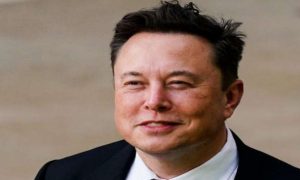Billionaires Elon Musk and Vivek Ramaswamy—co-heads of the Trump administration’s Department of Government Efficiency (or “DOGE”)—say they want to slash federal spending by $2 trillion, singling out a handful of federal agencies for what’s likely to be a difficult gambit, as Sen. Joni Ernst, R-Iowa, and other GOP lawmakers also float spending cuts.
Read More:- ‘It’s Illegal’: Rand Paul Breaks With Trump on Two Key Campaign Promises
Key Facts
Pentagon: Ramaswamy has suggested the commission could look for cuts to the Defense Department’s budget, saying the agency has “nearly a trillion dollars of budget—they can’t even tell you where it goes,” as Ernst—who is leading a group of Republican senators called the “DOGE caucus”—claimed on X the agency “wastes $125 billion on bloated bureaucracy” (Musk’s SpaceX has a reported $3.6 billion in federal contracts with the Pentagon).
Department of Education: Trump has called for the dismantling of the department for several years, and the commission is doubling down as Ramaswamy said that he expects “mass reductions” and “certain agencies to be deleted outright,” he told Fox News in response to a question about the department.
Read More:- ‘Like nothing you’ve seen’: Trump team readies a flurry of executive actions for Day 1
Corporation for Public Broadcasting: Musk and Ramaswamy wrote an op-ed in the Wall Street Journal this week, in which they said “$535 million a year” spent on the nonprofit overseeing broadcasting networks PBS and NPR was an example of “unauthorized” spending and money used in ways “that Congress never intended,” though the organization was created and authorized by Congress.
Planned Parenthood: They intend to cut “nearly $300 million to progressive groups like Planned Parenthood,” they wrote in the Journal; Planned Parenthood receives about $50 million annually from the federal government.
Read More:- “You can’t just get rid of them”: Experts say Trump’s “power grab” may already be doomed
International organizations: They also plan on taking aim at “$1.5 billion for grants to international organizations,” though it’s unclear which organizations they are referring to.
Internal Revenue Service: Musk is expected to take aim at the IRS, according to a report from the Wall Street Journal citing anonymous sources—he has reportedly been in discussions with the agency to create a free tax filing app, posts from both Musk and DOGE’s X accounts suggested simplifying the tax code, and Ernst suggested an audit of the agency.
Read More:- Musk’s Co-Chief Vivek Ramaswamy Vows to ‘Delete’ Entire Government Agencies
Federal Trade Commission, Department of Justice and Securities and Exchange Commission: While Musk and Ramaswamy have not directly addressed their plans for these agencies, Musk is reportedly expected to make cuts to them, the Wall Street Journal reported.
NASA: Musk and Ramaswamy have not identified specific cuts from NASA, but Congressional authorization for some funding to the agency are set to expire this year and Ernst has claimed that cuts could be made from the “more than $500 million” spent to give “bureaucrats and contractors unearned bonuses” at the agency. Forbes has reached out to NASA for comment.
Read More:- Voices: If Donald Trump demands that Britain chooses between EU and US, there is only one answer we can give
Where Else Could Doge Make Cuts?
Government programs that “Congress no longer authorizes” should be defunded, Ramaswamy wrote on X, formerly Twitter, the social media platform that Musk owns. While neither Musk nor Ramaswamy have identified specific cuts that fall under this umbrella, top programs for which Congressional authorizations are expiring this year are related to veterans’ healthcare, drug development and NASA (which Musk’s SpaceX has a reported $11.8 billion in federal contracts with), according to the Congressional Budget Office. Musk has floated a handful of other smaller cuts, reposting content on X that suggested federal funds were spent on “transgender monkeys, DEI and checks to dead people,” to which he said it “looks like a lot of opportunity for @DOGE!”
Read More:- Trump issues early challenge to GOP Senate with defiant nominations
Can Doge Make Cuts Without Congress?
“Skeptics question how much federal spending DOGE can tame through executive action alone,” Musk and Ramaswamy wrote in an op-ed in the Wall Street Journal, adding that Trump has previously suggested the statute that prevents the president from stopping spending authorized by Congress is unconstitutional. The statute, the Impoundment Control Act, was established in 1974 in response to then president Richard Nixon’s refusal to release congressionally-approved spending on programs he opposed. While the federal budget requires approval from the president, Congress decides the amount and type of federal funding every year. Similarly, simplifying the tax code, as they have suggested, would also require legislative approval. Senators Ernst, Ted Budd, R-N.C., Rick Scott, R-Fla., John Cornyn, R-Texas, Mike Lee, R-Utah, Roger Marshall, R-Kan. and James Lankford, R-Okla. have formed the DOGE caucus, though none of them are on the Senate Appropriations Committee that writes spending bills. Musk posted Monday that the “excellent work” of Ernst and other legislators has been “very helpful.”
Read More:- Trump picks Kristi Noem to serve as his Homeland security secretary
Is The Senate Gop Pushing Doge To Make Cuts?
Ernst, in a lengthy thread on X, listed out some other ideas of where spending could be cut, like changing the composition of coins to reduce the cost of producing pennies and nickels, reigning in production of “government swag” like mascots and key chains and cutting funding to train projects in California. She also suggested consolidating cloud computing software licenses for federal agencies—Amazon, Oracle, Google and Microsoft are among some of the largest cloud providers.
Will There Be Layoffs?
Musk and Ramaswamy wrote in a the Wall Street Journal opinion piece published Wednesday that they planned to embed DOGE appointees in government agencies, “aided by advanced technology,” and identify “the minimum number of employees” necessary for the agency to perform its core functions. The move will result in fewer employees, Musk and Ramaswamy wrote, as they plan on cutting “administrative overgrowth” through “large-scale firings” and the relocation of federal agencies out of Washington. They also expect and welcome “a wave of voluntary terminations,” they wrote, after suggesting that they intend on imposing a return-to-office policy that would require federal employees to head in five days a week. “DOGE’s goal is to help support their transition into the private sector” through severance payments and “incentives for early retirement,” they wrote. Musk suggested in October that laid-off workers could get up to two years’ pay in severance.
Read More:- House vote hangs in balance as Trump appoints border czar
When Are Cuts Expected?
Rep. James Comer, R-Ky., chair of the House Oversight Committee, tapped Rep. Marjorie Taylor Greene, R-Ga., Thursday to chair a subcommittee that will work with DOGE to focus on government waste. The subcommittee is reportedly expected to be established early next year, according to CNBC, citing anonymous sources. The deadline for cuts is July 4th, 2026. Musk posted on X that he expects the cuts to be “done much faster.”
Big Number
1%. Annual salary and benefits for federal employees, excluding military personnel, only amount to about $305 billion per year in the $6 trillion federal budget, said Brian Reidl, a senior fellow at the center-right think tank Manhattan Institute, told the Washington Post. This means that if 25% of all employees—a high estimate—were eliminated, spending would be reduced by 1%, Reidl said.
Read More:- Opinion: Democrats have one way to stop Trump in GOP Senate. You can thank Sinema for that.
Forbes Valuation
Space X and Tesla CEO Elon Musk, whose estimated net worth is $320 billion, according to Forbes’ real-time billionaires tracker, is the richest person in the world. Most of his fortune is tied up in Tesla and SpaceX shareholdings, where he is the largest individual shareholder. Musk doesn’t need to divest from his investments or step down from positions at private companies, as his role is considered an outside adviser to the federal government. A rally of biotech company Roivant Sciences shares sent Vivek Ramaswamy’s estimated net worth across the $1 billion threshold Thursday morning.



























